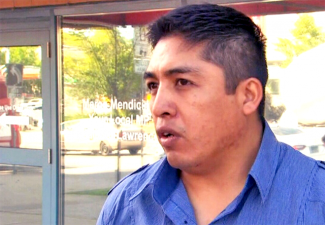PLOWED UNDER
Migrant farmworkers denied rights and means to protect themselves

Luis Gabriel Flores Flores came from Mexico to work on an Ontario farm
“WE COME HERE TO WORK. NOT TO DIE.” The words belong to a migrant worker on a farm in Quebec. They capture a hard truth: to be a migrant farmworker in Canada today puts you among the most vulnerable to the coronavirus and death on the job.
Another hard truth is that the federal government has yet to do enough to change that fearsome reality.
Migrant farmworkers are among the hardest hit groups during the pandemic. The virus has infected close to 1,000 of them in Ontario, three of whom died.
Whistleblower fired
Juan Lopez Chapparo, a 55-year-old father and his bunkmate Luis Gabriel Flores Flores were both infected while at work on an Ontario farm. Covid killed Chapparo.
Flores contacted journalists to share his fears over what he considered to be unsafe working conditions. One day after his bunkmate died, Flores and three others were fired. They believe it was because they dared to speak out.
Flores is in Canada on a restricted work permit, which means his ability to remain in Canada was tied completely to the specific employer he had travelled to Canada to work for.
“My story is a story of many others,” he said. “What happened to me can and does happen to many migrant workers.”
“We spend most of the year in Canada, more time than we spend home with our families. We are an essential part of this economy and society, and we deserve the same rights.”
Fear and intimidation
Kit Andres, an organizer with the Migrant Workers Alliance, says the entire community of 60,000 seasonal farmworkers in Canada live in a climate of “fear and intimidation.” She says it comes from the fact their bosses are usually also their landlords. The “fear and intimidation” was there long before the novel coronavirus emerged, she says.
Migrant workers have been calling her for years with complaints about racism, as well as cramped, unhygienic conditions, sometimes with little to no food.
“The problem is not about individual employers. It’s not about a few bad apples breaking the rules. It’s that the rules themselves are not good enough,” said Andres.
“Without having their permanent resident status here, they will never feel completely free to assert their rights and speak out ... they’re sick of being in constant crisis.”
Federal response misses the point
On July 31 prime minister Trudeau announced his government will invest nearly $59 million to improve the protections to migrant workers on Canadian farms amid the coronavirus pandemic. “This will fund more farm inspections, provide emergency relief when needed and improve the overall living conditions on farms,” he said.
More inspections will do nothing to help the migrant workers at Balamore Farm in Great Village, Nova Scotia. The workers there say they were forced to lie when government inspectors showed up at a pre-arranged time to investigate complaints the workers had made.
The Balamore workers reported that supervisors chose which workers would speak to inspectors and instructed them to say “that they are treating us good and paying us ok and if they dont they are going to go back to Jamaica and they won’t be able to go to another farm either”.
“We know that inspections can only enforce existing laws, but the existing laws are bad,” says Kit Andres. “More inspections won’t save lives; giving migrants the power to protect themselves and have equality through permanent immigration status will.”
"I think the solution is status for all migrants, including migrant workers,” says Stacey Gomez, an activist with No One Is Illegal. "Without full and permanent immigration status, all other measures will fail to protect workers’ lives and livelihoods from COVID-19, poor housing, and employer exploitation."
Many Canadians agree. More than 10,000 have signed an online petition demanding permanent status for the farm workers who put food on our tables.
- 30 -
LINK to migrant worker petition













Add new comment